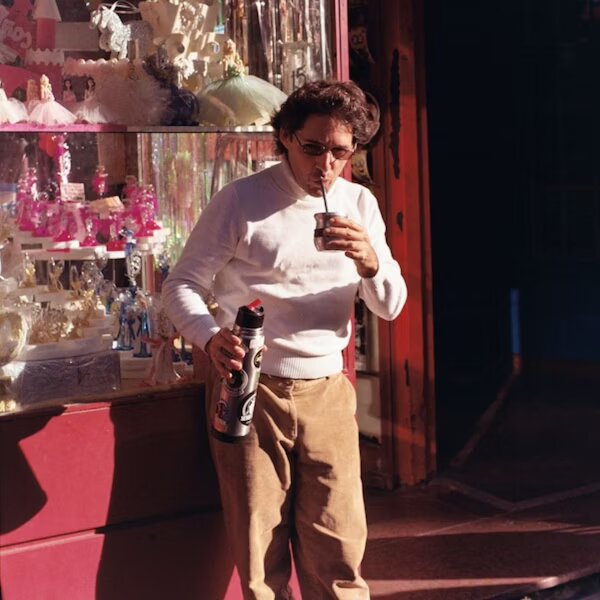
—JUAN WAUTERS—There’s freedom to be found in consistency. Until recently, Juan Wauters may not have agreed with this statement. As a touring musician and multinational citizen, transience had always come naturally to him. Circumstance, however, recently prompted him to reconsider the benefits of staying in one place: “During COVID I discovered / that I like stability,” he muses on the title track of his new album, “but the world still sees me / as a wandering rebel.” His most introspective work to date, Wauters’ sixth solo album Wandering Rebel finds the artist taking stock of how he’s changed, how the world sees him, and what he wants out of life.
From his early days as a founding member of Queens-based garage act The Beets to his impressive solo career, Wauters has spent the better part of the last decade on the road. When he wasn’t touring or recording, he was gathering material, traversing Latin America to write his 2019 Spanish-language opus La Onda de Juan Pablo, then heading North to collaborate with friends like Mac DeMarco, Homeshake, Nick Hakim and more for 2021’s boisterous Real Life Situations. Apart from intermissions in his home base of Jackson Heights, Queens, Wauters has been notoriously hard to pin down.
The lack of touring in the years following the 2020 pandemic lockdown, however, brought Wauters’ wayfaring lifestyle to a screeching halt. After spending the majority of the year at home in New York, he relocated to Montevideo, Uruguay at the end of 2020, prior to the release of Real Life Situations. It would be another year before he’d be able to tour again, and over the course of that year, he embarked on voyages to LA and New York, with the aim of recording full albums in each city. Though many of the songs from these sessions did make it onto Wandering Rebel, the final product is, like Wauters himself, impossible to attribute to just one place. And each time he returned to Montevideo from these sojourns, he realized the unexpected had happened–he’d put down roots. His short-term stay had become a long-term relocation, and a casual romance had turned into a serious partnership. “If touring never came back,” Wauters reflects now, “I would have been at peace [with it]. New York was the place I always came back to, but I never really had a ‘home.’ My parents left Uruguay, their home, when I was young. Now, [in Montevideo], I have a place to come home to, and people that are waiting for me.”
Written mostly during this extended break from touring, the songs on Wandering Rebel are candid reflections on subjects like career (“Wandering Rebel”), romantic commitment (“Amor Amor”), mental health (“Nube Negra”) and the personal toll of touring (“Let Loose”). Wauters’ lyrics have always had a refreshing sincerity, but he seems to be at his most open on this record. “I’m looking to have a family,” he states on “Wandering Rebel,” “so if this music thing not pick up / we’ll have to make some changes up in here.”
He extends that same bemused frankness to the world around him as well: on “Modus Operandi,” he voices his frustration with New York’s fairweather residents, who fled the city at the onset of the COVID-19 lockdown. “It’s happened time and time again,” he laments, “when it gets rough out here / People that have options go back to their suburbs.” Vocal contributions from fellow New Yorker Greta Kline (Frankie Cosmos) add to the chorus of playful disapproval. On the singalong-worthy “Millionaire,” he turns his eye to the west coast: “It’s hard to get around Los Angeles / If you don’t have a car / I’m staying in a privileged part of town / It’s suspicious for me to be walking.”
The clarity with which Wauters approaches these subjects lyrically is reflected in the music as well. His trademark eclecticism is still present (fans of Real Life Situations’ spirited hip-hop should look to track 6, “Bolero”), but it’s more refined this time, anchored in his signature Latin-influenced indie folk. Wandering Rebel is peppered with delicate additions that add depth throughout: rain sounds and hand drums on “Nube Negra,” a strings section on “Modus Operandi,” a gentle vibraphone on “Amor, Amor.” Some of these are classic Wauters touches, but others are owed to outside influences, like production from Brooklyn-based Carlos Hernandez (Ava Luna, Carlos Truly) and Brazilian indie artist Sessa, as well as vocal contributions from Kline, Luz Elena Mendoza (Y La Bamba), Zoe Gotusso, and Super Willy K.
Throughout Wandering Rebel, Wauters attempts to reconcile the stability he’s come to enjoy with the nomadic restlessness that’s characterized his life thus far. In the end, though, it’s the interplay of both of these elements that makes the album so strong. Though it’s marked by introspectivity, it was made in classic Wauters fashion, with numerous collaborators on trips to New York, LA, Brazil and Argentina. At the same time, its cohesion is owed to a period of reflection that’s only possible in repose. Wauters’ moments of honest self-reflection lend depth to his penchant for playful musical experimentation, while his ever-growing network of collaborators across the globe add nuance and fluidity to his songwriting.
For a brief period during the writing process, Wauters spent a month alone in a remote Uruguayan beach town, armed with only an iPad (which he charged using a solar panel) and his thoughts. In the end, only one song from this stint made it onto Wandering Rebel (“Mensaje Codificado”), but somehow the entire album feels as if it’s written from this vantage point: an artist, back in his home country, looking out at the world and considering the life that’s led him there.




